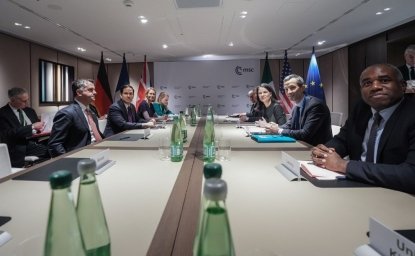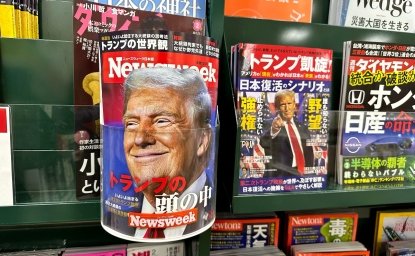The Consequences
In this Expert Take, Luis Rubio discusses the consequences of Trump's visit to Mexico.
In this Expert Take, Luis Rubio discusses the consequences of Trump's visit to Mexico.

A Polish tale tells of a town that built a bridge but did not finish it. Vehicles used it and, on reaching the end, fell off into the abyss. The town leaders got together to decide what to do and their response was to construct a hospital under the bridge to care for those injured as a result of their fall. Mexico's government seems to be like that: great initiatives that are not concluded, desperate actions that are not thought through and, later, consequences that are to be dealt with.
The succession of circumstances and actions that led the government to invite Mr. Trump to Mexico is now quite clear. It is also known that the invitation was issued weeks before and at the margin of the professionals responsible for conducting foreign affairs. A candidate was invited and, later, at a quarter to midnight, in the colloquial vernacular, another invitation was sent to the Democratic Party candidate, so as not to incur in a slight. Mr. Trump arrived, was treated as a Head of State, listened to the formal and respectful speech delivered by President Peña and proceeded happily to Arizona to reiterate his rhetoric regarding Mexico and Mexicans.
In addition to the gift of the red-carpet treatment, which was something invaluable for Trump because that is where his opponent has ample experience and world recognition, the Republican candidate made off with what is most valuable to Mexico: the Mexican President was obsequious in offering him the renegotiation of the NAFTA, something no country ever does because that implies, de facto, its annulment, i.e., precisely what Trump has proposed. In just a few hours, the President placed the country and his government in the most vulnerable position that it has been in since the Revolution of 1910.
In an article appropriately entitled “The Unspeakable and the Inexplicable”, the British periodical The Economist states that “Mr. Peña may believe that he took a bold initiative by opening a dialogue with Mr. Trump. His demand for respect is legitimate. But it should be delivered by citizen diplomacy within the United States, and conveyed after the election to the winner. By allowing his visitor to seem presidential, he has helped Mr. Trump perform some rhetorical climbdowns that were electorally inevitable. Even if Mrs. Clinton wins, she will not thank him for that. If he turns out to have contributed to electing Mr. Trump, many Mexicans will never forgive him or his party, and neither will much of the rest of the world.” It is not by chance do other articles ask “What was he thinking.” In a few hours, the government lost its privileged relationship with the Obama administration, exhibited irrational behavior and proved itself to be an untrustworthy actor. Mexico became the laughingstock of the world.
Whatever the logic in concocting the invitation had been, the latter ignored the nature of Trump, the absolute impossibility of changing his speech (because therein lies the heart of his candidacy) and, above all, the fact that for Mexico everything was a risky downside, while for Trum everything was potential upside. Mexico, the host, borne all the risk, and lost out. The very notion that Trump could be “reasoned with” and convinced to tone down his discourse goes against was ludicrous.
The question is: What’s next? The approaching months will be without doubt dark days. Many will interpret Trump's call for renegotiating NAFTA (therefore, presumably, not annulling it) as a sign that Mexico's vulnerability was drastically reduced. This perhaps will contribute to appease the financial markets, at least in the short term, but will not satisfy the skeptics; we must not forget that the main justification for calling into question Mexican debt’s investment-grade score on the part of Moody was not the debt per se but rather the political problems that characterize the country and that are reflected in the manner in which decisions are made and in the absence of the Rule of Law.
In his book on the circumstances that led to the 1994 devaluation, Sidney Weintraub* concludes that it was the absence of accountability that made it possible for the functionaries of the outgoing and incoming administration to make brutally dangerous wagers, something inconceivable in a representative democracy. That is what manifested itself in the Trump Affaire: the government undertook a series of actions and decisions without needing to think about the consequences, without measuring the risks, and without consulting with other political forces (let alone the rest of the cabinet) on the alternatives, because that is Mexico's political reality: the government is not accountable to anyone and its members will not have to bear the costs of their decisions.
There are two planes on which to deal with the consequences. The first is obvious and urgent: rebuild the relationship with the U.S. government and with the Clinton campaign. This will not be easy because the problem is one of trust and, when this has been lost, it is supremely difficult to recover, and worst, in the middle of such an acrimonious campaign. This may only be possible to the extent that the President carries out a radical change in his Cabinet, incorporating individuals who enjoy the absolute respect of the international community in general and of people in the U.S. in particular, in the political, judicial, financial ambits and that of foreign policy.
The other plane comprises the future. President Peña has wasted every opportunity presented to him: he could have become the leader of the struggle against corruption (i.e., the Mexican White House) and of the fight against impunity (i.e., Ayotzinapa). Now he has the last opportunity: to begin to forge checks and balances so that never again can decisions be made that so dramatically jeopardize the viability of the nation.
*Financial Decision Making in Mexico


The Mexico Institute seeks to improve understanding, communication, and cooperation between Mexico and the United States by promoting original research, encouraging public discussion, and proposing policy options for enhancing the bilateral relationship. A binational Advisory Board, chaired by Luis Téllez and Earl Anthony Wayne, oversees the work of the Mexico Institute. Read more


